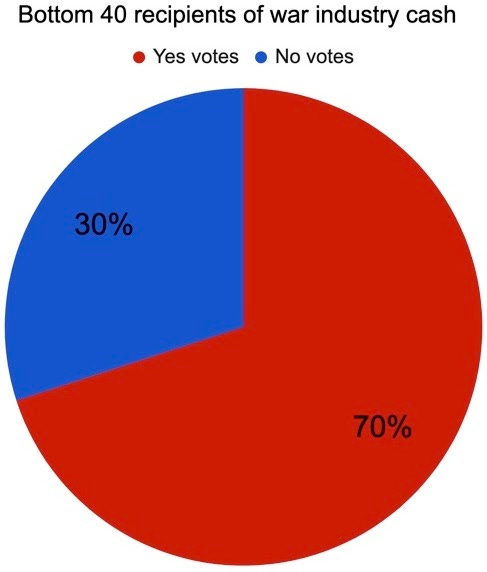House Democrats get paid by weapons makers to buy more weapons, a breakdown
Speaking Security Newsletter | Advisory Note for Organizers and Candidates, n°59 | 8 December 2020
I compared how House Democrats voted on Trump’s military budget with how much campaign cash they took from the defense industry. On average, Democrats who voted for the bill received 4x more than those who voted against it.
**The military-industrial complex also bankrolls think tanks, which corrupts policy development in the same way it corrupts congressional votes. So please support SPRI on Patreon (we’re 100% grassroots-funded. Our work, here).**
Context
The House passed the final version of the Fiscal Year (FY) 2021 National Defense Authorization Act (NDAA) today that authorizes $740.5 billion in military spending, by a vote of 335-78.
The amount authorized by this NDAA is a $129.3 billion increase from Obama's last military budget (FY2017 NDAA). Joining 140 Republicans, 194 Democrats voted for the bill.
This is a serious problem. By passing the FY2021 NDAA, House Democrats:
Ignored public opinion. So did congressional Republicans (who accept about the same amount of war industry cash as Democrats), but Democratic support for a $740.5 billion military budget is much more at odds with the views of the party’s base, considering public opinion polls like this one and this one. If it was the other way around I’d be writing about Republicans here instead.
Gave up a source of leverage. The play for House Democrats should have been to refuse to pass the NDAA (considered a “must pass” bill) until the Senate passed a decent relief bill (featuring — among other provisions — direct payments to US adults, which is supported by 82 percent of registered Democrats and 70 percent of all Americans).
Top-line stats
Average amount received from the war industry (2020 election cycle) among House Democrats who voted Yes on the bill: $36,755
Average amount received from the war industry (2020 election cycle) among House Democrats who voted No on the bill: $8,869
Keep in mind that defense contractors are publicly subsidized so their political donations are, too. For example, 70 percent of Lockheed Martin’s total revenue in 2019 came from the Pentagon, meaning that about 70 percent of the $4 million it spent on candidates this election are really just recycled taxpayer dollars. (More on this corrupt practice, here.)
*Data via Open Secrets. Figures refer to the 2020 election cycle (2019-20).
A breakdown
I lined up House Democrats by the amount received from defense contractors and grouped them into fourths. Higher levels of campaign contributions from the defense industry meant higher levels of support for the defense bill. Other findings:
The bottom 25 percent of war industry cash recipients voted Yes 74% of the time, while members in the top 25 percent voted Yes 98% of the time.
The bottom 50 percent of war industry cash recipients accounted for 78% of House Democrats’ No votes on the Pentagon budget.
*No campaign finance data available for Rep. Tulsi Gabbard, so I excluded her from this count (begrudgingly — Gabbard was one of the 37 Democrats to vote No on the bill).
A couple charts
I compared the votes between the highest vs. lowest recipients of defense contractor campaign contributions. Findings:
The bottom 40 recipients of war industry cash accepted an average of $1,039 and voted properly 30 percent of the time:
The top 40 recipients accepted an average of $118,468 and voted properly 0 percent of the time:
Conclusion
Most Democrats vote poorly on military spending. But the ones who vote well do not rely on campaign contributions from the war industry.
Thanks for your time,
Stephen (@stephensemler; stephen@securityreform.org)
Find this note useful? Please consider becoming a supporter of SPRI. Unlike establishment think tanks, we rely exclusively on small donations.



